

Colonel Smith Middle School. 5 Minute Marking Plan by @TeacherToolkit and @LeadingLearner. Marking is an occupational hazard for all teachers.
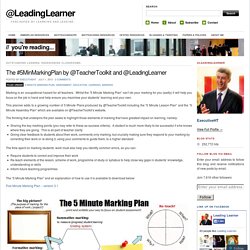
Whilst the “5 Minute Marking Plan” can’t do your marking for you (sadly) it will help you focus on the job in hand and help ensure you maximise your students’ learning and your own. This planner adds to a growing number of 5 Minute Plans produced by @TeacherToolkit including the “5 Minute Lesson Plan” and the “5 Minute Assembly Plan” which are available on @TeacherToolkit’s website. The thinking that underpins the plan seeks to highlight those elements of marking that have greatest impact on learning, namely: Sharing the key marking points (you may refer to these as success criteria). A student is much more likely to be successful if s/he knows where they are going.
The time spent on marking students’ work must also help you identify common errors, so you can: Where lesson observations go wrong « David Didau: The Learning Spy. Can we define an outstanding lesson?
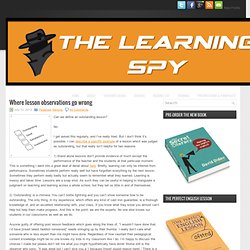
No. I get asked this regularly, and I’ve really tried. But I don’t think it’s possible. I can describe a specific example of a lesson which was judged as outstanding, but that really isn’t helpful for two reasons. 1) Stand alone lessons don’t provide evidence of much except the performance of the teacher and the students at that particular moment. 2) ‘Outstanding’ is a chimera. Anyone guilty of offering post lesson feedback which goes along the lines of, “I wouldn’t have done that, I’d have [insert latest faddish nonsense]” needs stringing up by their thumbs. Lesson observation, if it is to be productive and actually help teachers improve, needs to focus less on making judgements and more on teasing out teachers’ expertise. Now, if as a teacher, we answer, “I don’t know.” Observation feedback should be a series of questions with the observer genuinely trying to find out what was going on in the snapshot they were privileged to have seen. Related posts. School Development Planning at KEGS.
Writing a School Development Plan is a process most, if not all, schools engage in.
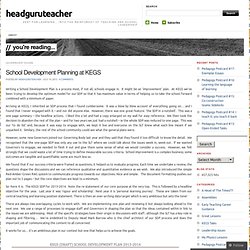
It might be an ‘improvement’ plan. At KEGS we’ve been trying to develop the optimum model for our SDP so that it has maximum value in terms of helping us to take the school forward combined with a minimum of paper. Arriving at KEGS, I inherited an SDP process that I found cumbersome. It was a blow by blow account of everything going on… and I found that I never engaged with it – and nor did anyone else. However, there was one great feature: ‘the SDP in a nutshell’. However, some new Governors joined our Governing Body last year and they said that they found it too difficult to know the detail.
We found that if our success criteria were framed as questions, it helped us to evaluate progress. Awawithefayries : We need a little less Delores... In praise of great use of school performance data – Mike Bostock. 4Matrix. Advanced Lesson Observation Form Click here to download Form Click here to download Notes These are the latest versions of the Advanced Lesson Observation Form plus the notes on how it is intended to be used.
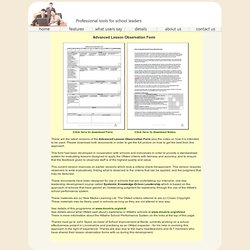
Please download both documents in order to get the full picture on how to get the best from this approach. This form had been developed in cooperation with schools and individuals in order to provide a standardised system for evaluating lessons designed to apply the Ofsted criteria with fairness and accuracy, and to ensure that the feedback given to observed staff is of the highest quality and value. This current version improves on earlier versions which took a criteria check list approach. These materials are (c) New Media Learning Ltd. Thanks must go to John Taylor, ex-head of School Improvement at Becta, currently working on a school effectiveness project in Lincolnshire and practising as an Ofsted inspector - for his help in evolving this approach in the light of experience.
Use SpeakPipe to Send Voice Messages to Email Recipients. Questions to ask. 10 Great, Free Apps for Students for Notetaking and Class Planning. These days, there are some great apps for students to use to take notes for class, or to use as class planners. 1.
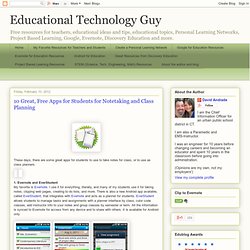
Evernote and EverStudent My favorite is Evernote. I use it for everything, literally, and many of my students use it for taking notes, clipping web pages, creating to do lists, and more. There is also a new Android app available, called EverStudent, that integrates with Evernote and acts as a planner for students. 2. Skitch also works with Evernote and allows you to create sketches and annotate, edit and save photos and your sketches. 3. MySchoolNotebook is another note taking app I just reviewed earlier here: 4. Memonic is similar to other note taking tools in that you can clip web content, take text notes, share notes, and access it from any computer. There is also a feature coming that will allow you to use Memonic's web clipper to save notes directly to your Evernote account. 5. SimpleNote is exactly what it's name says - it's a free, simple note taking app. 6. 7. 8. 9a.